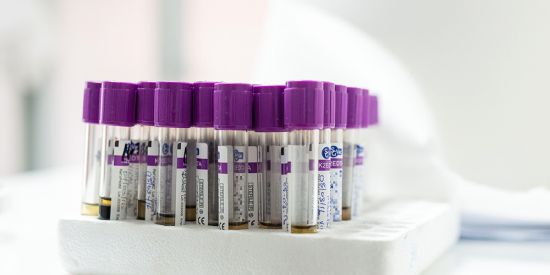Improving HIV treatment for children and adolescents - the right way

Blood samples from patients for viral load and HIV resistance testing.
(Photo: Christian Heuss, SolidarMed)
Globally, around 2.6 million children and adolescents are currently living with HIV, the majority of them in Africa. These young people are much more likely to experience treatment failure than adults. Experts long assumed that testing for viral drug resistance could improve treatment in cases where treatment has failed. However, a research team led by the University of Basel now shows that it is much more important to support the patients in taking their medication regularly.
18 July 2024
The fight against HIV has made great strides over the past few decades. Antiretroviral drugs keep the virus at bay, preventing it from reproducing in the body and from being transmissible to others. However, there are variants of the virus that have become resistant to these medications. In high-income countries, doctors therefore test the virus for resistance mutations if a particular antiretroviral therapy is failing to take effect.
In resource-limited regions, however, such tests for viral mutations are not so readily available. If the treatment does not work as hoped, all the attending physicians can do is guess, and decide on further treatment steps on that basis: In order to circumvent a possible resistance of the virus, the treatment should be switched to other medication. However, if the reason for the treatment failure is that the medication was not taken daily as intended, the medication should not be changed.
In light of limited funding for HIV programs in a number of African countries, discussions are ongoing among experts on whether treatment success could be improved by providing more resistance tests, particularly for children and adolescents.
Members of the "GIVE MOVE" clinical trial team in Lesotho.
(Photo: Jennifer Brown, SolidarMed)
Researchers led by Professor Niklaus Labhardt at the University of Basel and University Hospital Basel have therefore got together with various international partners to investigate whether these cost- and labor-intensive tests are actually an effective lever for better HIV management. The results of their study, entitled “GIVE MOVE”, appear in the scientific journal The Lancet Global Health.
Resistance tests are ineffective alone
The study took place in 10 clinical centers in Lesotho and Tanzania and gathered data from 284 participants between the ages of six months and 19 years. The children and adolescents were all receiving antiretroviral therapy, but were still showing a high concentration of the HIV virus in blood samples.
A lab technician in Lesotho prepares blood samples to measure viral load.
(Photo: Niklaus Labhardt, SolidarMed)
The researchers divided the patients at random into two groups. One group underwent tests by specialist staff for viral mutations that confer resistance. The second group received the usual care, with repeated viral load testing and empirical treatment.
The results indicated that the genetic tests for resistance did not significantly improve treatment. Thirty-six weeks after the starting point of the study, there were no significant differences in viral load between the two groups. “This contradicts the assumption that treatment supported by resistance tests would meaningfully improve clinical and virological outcomes,” summarizes Dr Jennifer Brown, lead author of the study.
Adherence to therapy is crucial
The main reason for the continued high viral load despite antiretroviral medications seems to be that the drugs are not being taken every day as intended, according to study leader Niklaus Labhardt. “Improving adherence to therapy would be more effective than introducing resistance tests more broadly. The reason that this result is so important is that it helps us prioritize where we want to put the limited funding for HIV programs.”
The researchers hope that the study results will lead to more resources being made available to programs that take into account the specific needs of children and adolescents and that thereby improve their adherence to treatment. At the same time, it will be important to better understand which individuals are at the highest risk for viral resistance, so that costly resistance testing can be provided in a more targeted manner.
Working alongside researchers from the University of Basel and University Hospital Basel were also experts from the Swiss Tropical and Public Health Institute, the non-profit organization SolidarMed, the Baylor College of Medicine Children’s Foundation, and the Seboche Mission Hospital in Lesotho, as well as the Ifakara Health Institute and the Management and Development for Health organization in Tanzania. The study was financed by three foundations: Fondation Botnar, the Swiss National Science Foundation and the Gottfried und Julia Bangerter-Rhyner-Stiftung.
Further information
Original publication
Jennifer Anne Brown et al.
Resistance-informed versus empirical management of viraemia in children and adolescents with HIV in Lesotho and Tanzania (GIVE MOVE trial): a multisite, open-label randomised controlled trial
The Lancet Global Health (2024), doi: 10.1016/S2214-109X(24)00183-9
Contact:
Reto Caluori | Leiter Kommunikation
Universität Basel | Kommunikation & Marketing | Kommunikation
Petersgraben 35 | Postfach | 4001 Basel | Schweiz
Tel. +41 61 207 24 95 | Mobil +41 76 416 18 68
https://www.unibas.ch
Source: https://www.unibas.ch/en/News-Events/News/Uni-Research/Improving-HIV-treatment-for-children-and-adolescents---the-right-way.html
"Reproduced with permission - University of Basel"
University of Basel
For more HIV and AIDS News visit...
Positively Positive - Living with HIV/AIDS:
HIV/AIDS News
|